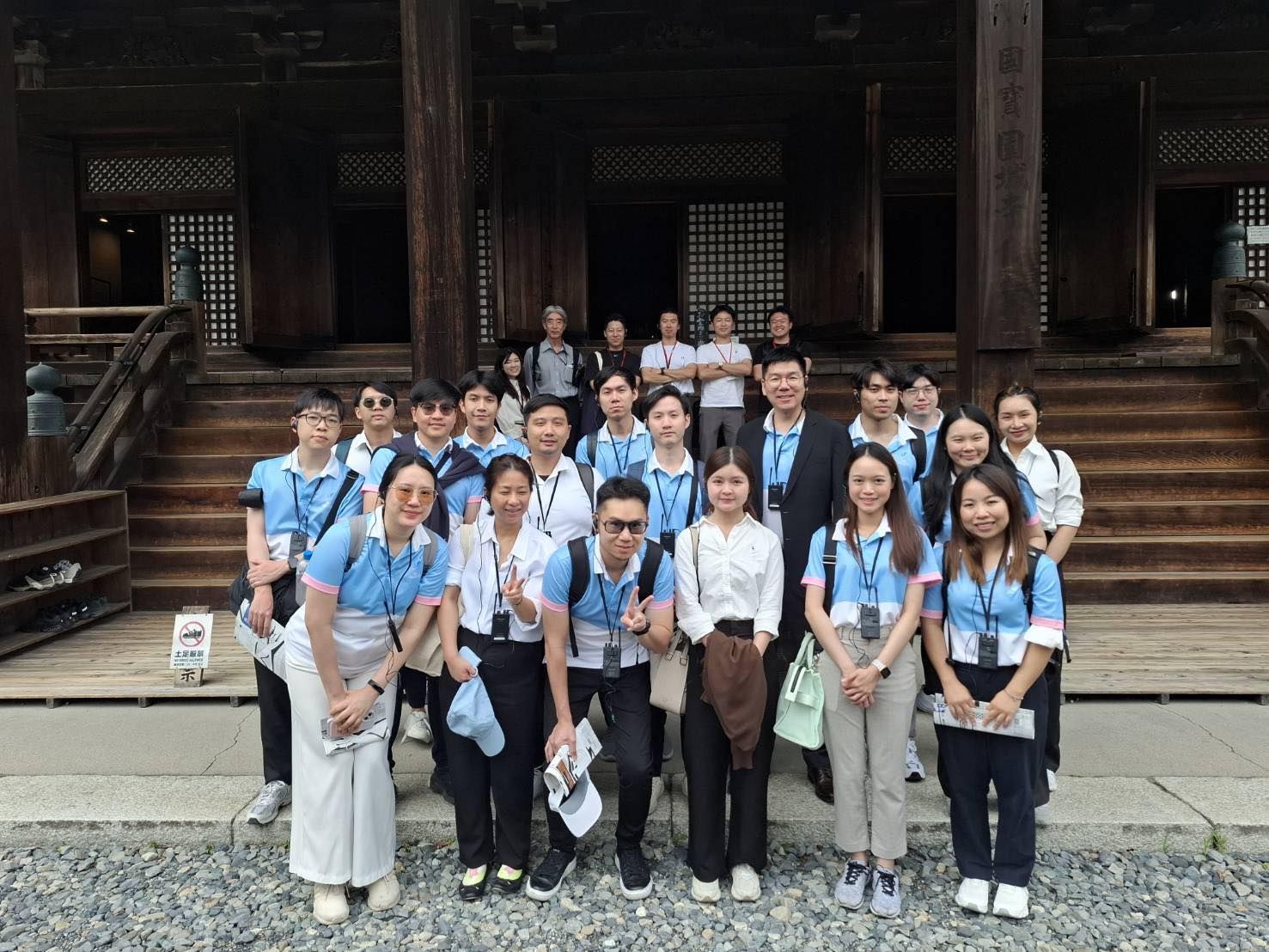
MBA English Program Class : Global Business Experience @Osaka
Our MBA Chula (English Program) students recently embarked on an enriching study trip to Kyoto and Osaka, Japan! This incredible experience was designed to give them firsthand insight into global business trends.
One of the highlights was a special lecture by Prof. Kiyoshi Kobayashi from Kyoto University on “People Centricity in AI-driven Worlds ” – the idea that even as AI advances, humanity remains at the core.
Prof. Kobayashi shared a powerful perspective: AI, specifically tools like ChatGPT, has established a new baseline for all industries and research. The critical task ahead is to find ways to differentiate ourselves beyond what AI can achieve. Beyond the technological insights, the lecture deeply reinforced the vital roles of Social Capital and the Well-being of people in our evolving AI landscape. These aren’t just buzzwords; they are the bedrock for sustainable growth. By fostering “democratic platforms” where everyone has an equal voice, we can significantly strengthen communities and enhance the overall quality of life.
In the afternoon, our journey led us to Mii-dera Temple in Shiga Prefecture, a site designated as one of Japan’s National Treasures. There, the head priest offered a compelling lecture on the profound importance of Buddhism, which has served as a foundational pillar of the country, deeply influencing Japanese culture and way of thinking for centuries.
He spoke of a dual world: the visible world, where people primarily focus on economics and rationality, and an invisible world, equally vital for navigating life. He noted that in our modern era, interest in or belief in religion is waning, a trend observable even in Japan. This means temples like Mii-dera face the considerable task of finding new ways to operate and preserve their rich heritage in an increasingly secular world.
This trip wasn’t just about lectures; it was about inspiring our students to think critically, innovate, and lead with a human-centered approach in an AI-powered world, all while gaining a deeper appreciation for both cutting-edge technology and timeless cultural wisdom.


Day 2: The Spirit of Japanese Management 
Today in Kyoto, we explored two powerful stories that exemplify how Japanese management blends tradition, innovation, and cultural preservation.
We were inspired by Ms. Kanako Suzuka, President of Shogoin Yatsuhashi, a renowned sweet maker established in 1689. She shared how the company stays true to its core philosophy—“Taste is Tradition”—while innovating through Nikiniki, a stylish brand designed for younger consumers. Her vision is to make these sweets a part of everyday life in Kyoto, not just occasional souvenirs.
Ms. Suzuka emphasized that the real challenge for Nikiniki lies in sustaining the brand. This demands ongoing creativity in both product development and presentation, including the release of seasonal products. She relies on word-of-mouth marketing, firmly believing that every product must meet the highest standards before reaching customers.
In the afternoon, we visited a Kyo-Machiya townhouse on Shinmachi Street, known as “Clear Sky Street” after overhead power lines were removed to preserve the scenic view for the Gion Festival. We were warmly welcomed by Ms. Fusae Kojima, homeowner and head of the Kyo-Machiya Rebirth Study Group, who shared her mission to preserve these historic townhouses, now decreasing in number across Kyoto.
Although rich in beauty and heritage, Machiya face challenges such as strict building regulations and high maintenance costs. Ms. Kojima highlighted the importance of community-driven initiatives, traditional craftsmanship, and finding a sustainable balance between tourism and everyday local life.




MBA English Study Trip – Day 3: The Spirit of Japanese Management 
On the third day, we had the privilege of learning from Prof. Yoshikazu Maegawa, who offered deep insights into the unique business culture of Kyoto.
Kyoto truly embodies the “heart of localism,” where a “mild yankee economy” thrives. Forget chasing the lowest prices or highest quality – in Kyoto, it’s all about supporting local friends, family, and community ties.
While global cities like Tokyo and Osaka chase growth and scale, Kyoto champions sustainability. Businesses may be smaller, but they often last centuries.
Japan boasts about 20,000 Shinise companies (businesses that over 100 years old), and Kyoto is a true hub, home to over 1,000 of them (3.6% of the national total!), specializing in everything from small manufacturing to traditional food and liquor. While Osaka has a similar number, Kyoto’s Shinise often represent a more intimate, locally-rooted business model.





MBA English Study Trip – Day 4: A Glimpse into the Future at Expo 2025 Osaka! 
What an incredible day as we geared up for our visit to the future site of Expo 2025 in Osaka! Before heading out, we had the privilege of hearing from Professor Takeo Mori, who is deeply involved with the Union of Kansai Government and the Kansai Pavilion for the Expo. His insights into the preparations were truly mind-blowing!
Prof. Mori shared the vision behind Expo 2025: “Designing Future Society for Our Lives.” This powerful theme is broken down into three compelling subthemes: “Saving Lives,” “Empowering Lives,” and “Connecting Lives.” The entire concept is envisioned as a “People’s Living Lab” – a dynamic laboratory for a future society!
The driving idea behind all of this? To reconnect countries and foster unity amidst diversity, especially after the divisions felt during COVID-19. This spirit is beautifully symbolized by the awe-inspiring Grand Ring, one of the world’s largest wooden structures with an outer circumference of about 2KM – representing global connection!
Even the venue itself is a marvel: Yumeshima, a man-made island created from reclaimed waste, stands as a symbol of sustainable innovation and future-oriented thinking.
We’re so excited to witness the progress of this monumental event. It’s an incredible opportunity to witness how visionary ideas are brought to life!



